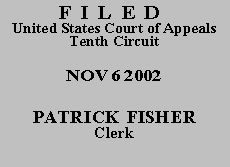

| JAMES FRANKLIN BROWN;
RICHARD VINCENT EDWARDS;
MICHAEL RAYBON,
Plaintiffs - Appellants, v. JIM GERINGER, individually and in his official capacity as Governor of Wyoming; JUDY UPHOFF, individually and in her official capacity as Director of Wyoming Department of Corrections, Defendants - Appellees. |
|
Appellants, appearing pro se, are inmates at Wyoming State Penitentiary (WSP). They filed a civil rights complaint alleging that appellees Jim Geringer, Governor of Wyoming, and Judith Uphoff, Director of the Wyoming Department of Corrections, were responsible for a variety of rights violations at WSP. The district court granted Mr. Geringer's motion for judgment on the pleadings and Ms. Uphoff's motion for summary judgment, which appellants now appeal.
Appellants raise a number of issues. They argue that the district court erred in denying a motion to file supplemental pleading, a motion for extension of time, and a motion for appointment of counsel. Appellants have failed to show that the district court abused its discretion. See Walker v. United Parcel Serv., Inc., 240 F.3d 1268, 1279 (10th Cir. 2001) (refusal to allow plaintiff to supplement claim reviewed for abuse of discretion); Ellis v. Univ. of Kan. Med. Ctr., 163 F.3d 1186, 1193 (10th Cir. 1998) (denial of motion for extension of time reviewed for abuse of discretion); Rucks v. Boergermann, 57 F.3d 978, 979 (10th Cir. 1995) (denial of motion for appointment of counsel in civil case reviewed for abuse of discretion).
Appellants further argue that the district court erred in disposing of the case just two days before a scheduled hearing on dispositive motions, but point to no reason why such a hearing is required to decide motions for judgment on the pleadings and summary judgment.
Appellants contend that Hayes v. Marriott, 70 F.3d 1144 (10th Cir. 1995), supports the proposition that summary judgment may not be granted when the moving party has failed to submit affidavits based on personal knowledge. In Hayes, however, the only evidence offered by the movant were unsworn statements in a Martinez report. Here, by contrast, Ms. Uphoff submitted voluminous prison records that were accompanied by a sworn affidavit and were therefore properly considered on summary judgment. See Fed. R. Civ. P. 56(e).
Finally, appellants also assert it was error to grant Mr. Geringer's motion for judgment on the pleadings and Ms. Uphoff's motion for summary judgment. We review both of these determinations de novo, applying the same standard as the district court. See Ramirez v. Dep't of Corr., 222 F.3d 1238, 1240 (10th Cir. 2000) (judgment on the pleadings); PeTA v. Rasmussen, 298 F.3d 1198, 1203 (10th Cir. 2002) (summary judgment).
Having carefully reviewed the parties' briefs, the record, and applicable law, we AFFIRM for substantially the reasons stated by the district court.
Further, appellants' motion requesting permission to expand the record is DENIED.
Entered for the Court
Circuit Judge
*. This order and judgment is not binding precedent, except under the doctrines of law of the case, res judicata, and collateral estoppel. The court generally disfavors the citation of orders and judgments; nevertheless, an order and judgment may be cited under the terms and conditions of 10th Cir. R. 36.3.